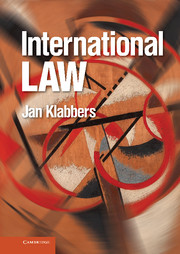Book contents
- Frontmatter
- Contents
- Detailed table of contents
- Table of cases
- Preface
- List of abbreviations
- Part I The structure of international law
- Part II The substance of international law
- 10 Use of force
- 11 The law of armed conflict
- 12 International criminal law
- 13 The seas, the air and outer space
- 14 Protecting the environment
- 15 The global economy
- Part III The surroundings of international law
- Bibliography
- Index
- References
13 - The seas, the air and outer space
from Part II - The substance of international law
- Frontmatter
- Contents
- Detailed table of contents
- Table of cases
- Preface
- List of abbreviations
- Part I The structure of international law
- Part II The substance of international law
- 10 Use of force
- 11 The law of armed conflict
- 12 International criminal law
- 13 The seas, the air and outer space
- 14 Protecting the environment
- 15 The global economy
- Part III The surroundings of international law
- Bibliography
- Index
- References
Summary
INTRODUCTION
With almost three-quarters of the globe being covered by water, regulation of the seas has always been of crucial importance to international law. Some of this importance stems from security concerns, but much of it resides in the economic relevance of the seas. This relevance, in turn, stems from two uses to which the seas can be put. They are, first, media of communication, allowing the transport of goods from point X to point Y, and for a long time provided the most obvious means available. Second, the seas and their subsoil are rich in resources, from fish stocks via oil and natural gas reserves to manganese nodules. What holds for the seas also holds, with only minor differences, for the air and outer space. These too are vital channels of communication, be it by means of airplanes or by means of radio waves, and to some extent, have resources to offer as well. The latter applies in particular to the moon and other celestial bodies.
For Grotius, writing his classic Mare Liberum more than four centuries ago, there could be no doubt that the seas should be free. For one thing, this was clearly God's wish; otherwise He would have made sure that the same animals and spices would exist everywhere, and maritime transport would not be necessary. More pragmatically, Grotius also held that the seas were incapable of being possessed; the oceans are too vast to be controllable by a single power, and since legal title has to start with actual possession, it followed that ownership of the seas was impossible.
- Type
- Chapter
- Information
- International Law , pp. 234 - 251Publisher: Cambridge University PressPrint publication year: 2013



